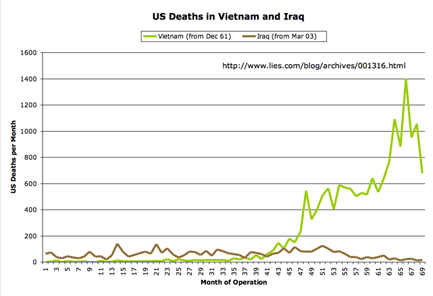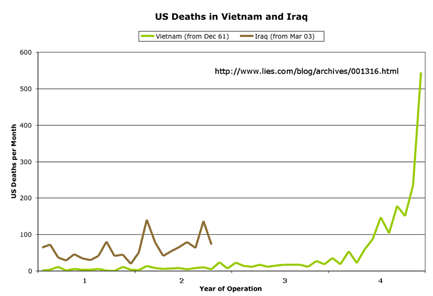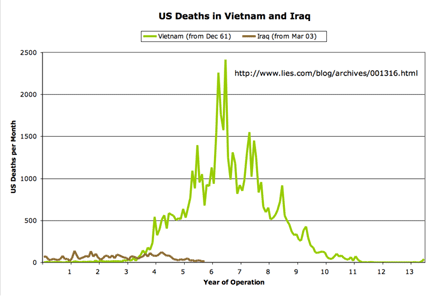A longtime lies.com link-suggester, who turns out to be Canadian, engaged me in the following interesting email exchange this morning. With his permission, I’m running it here with his identifying information removed.
From: [email deleted]
Subject: A Note From Abroad
To: jbc@lies.com
Dear jbc:
Just wanted to give you a take on the “word on street” from abroad — in this case, Canada.
The general sense here is that the US has completely lost it. Not just in regards to Iraq, but across the board. This torture scandal has pretty much tied it.
Particularly telling is that even the rightmost-leaning of my friends, who previously (grudgingly) supported the US invasion of Iraq, have abandoned their positions. (And for the record, there weren’t very many of those people in the first place up here.)
And for the vast majority of “people on the street” in Canada, it looks for all the world like you guys have simply gone insane. No media outlets in Canada ever pushed a connection between Iraq and Al Qaeda, which means that the whole supposed war rationale was a transparent sham from day one. (And we were already scratching our heads over the theft of the federal election!)
So here’s what we see: a rogue superpower, doing whatever it wants, answerable to no one (foreign or domestic), throwing dissenters at home and abroad in jail forever, flouting international law and its own laws on any whim, starting wars for fun and profit, alienating the world and even its closest allies, run by (at best) a mediocre intellect with a criminal background who blatantly stole the “election”. The populace of this rogue state is too cowed and terrified of being labelled as “unpatriotic” or singled out for punishment to speak up for their basic rights, more of which disappear — perhaps forever — every day.
There’s a word for this, and it’s not democracy. It’s despotism.
When the US is on its game, it is a shining example to the world. But when it slides down into despotism, it’s the scariest thing in the world.
And believe me, we are shared shitless of you guys.
Jesus, guys — if the US can slide into despotism, who the hell can’t?
(As always, please don’t publish my full name — I, too am scared of retribution.)
From: John Callender
To: [name and email deleted]
Subject: Re: A Note From Abroad
Could I run your letter as an item on the site, assuming I remove all identifying information from it?
From: [email deleted]
Subject: Re: A Note From Abroad
To: jbc@west.net
Of course, provided you agree to fix my typo of “supporters” to “supported” in the third para. (And any other typos you see.)
:)
Listen, I’ve re-read a couple of my letters to you recently, and they were pretty condescending and holier-than-thou. In retrospect, I really regret this.
You have to understand that many in Canada look to the US as a big brother — which is not so inaccurate. We do have the same parents — but where you guys are the rebels that stole the family Thunderbird and peeled off in a cloud of burned rubber, we are the quiet nerds that lived in the basement of the family home until we were 35.
This means that we have a unique perspective. When you exceed us — as you often do — we love you for it, since you’re family, and we’re rooting for you. Plus, like all little brothers, we secretly envy you.
And yet, when you go astray, we strangely feel guilty (guilt, by the way, is the Great Canadian Emotion(tm)), because we feel we should have been able to help you somehow. Plus we feel sad, since you are family, and we love you. And lastly, like all little brothers, we are worried about you.
But right now, it’s like we’ve just learned our big brother has ditched all his friends and gone on a crime spree, robbing banks and blowing people away. We love you, but we’re scared you’ll show up on our doorstep some night, drunk, with a gun on the seat of the old, idling Thunderbird, and demand that we join you.
I guess I’m saying we know we’re not superior to you. Quite the reverse — we will likely always play second fiddle to our big brother. But this raises the critical point I mentioned before — if our big brother can go bad, can’t we?
(Maybe you can wrap these two letters together somehow.)



